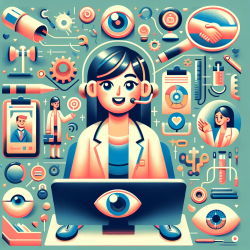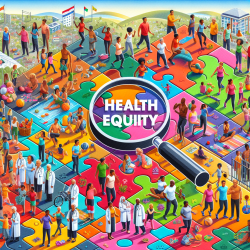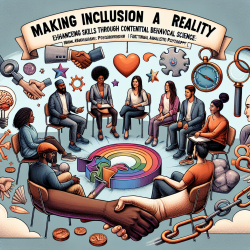The world of healthcare and education has been dramatically transformed over recent years, with challenges such as the COVID-19 pandemic and ongoing social issues like health disparities coming to the forefront. As practitioners, it is vital to not only adapt to these changes but also to rise to the challenge by improving our skills and understanding. This blog post will explore insights from the 2020 research article "Rise to the Challenge" and provide guidance on how practitioners can enhance their skills and continue to deliver effective care.
Understanding the Impact of COVID-19
The COVID-19 pandemic has reshaped many aspects of healthcare delivery, pushing practitioners to adopt new technologies and methods of care. Telehealth has become a cornerstone in maintaining patient care while minimizing physical contact. For practitioners in special education and therapy, this shift requires a rapid adaptation to digital platforms such as Zoom and other telecommunication tools.
The research highlights how practitioners have embraced these changes, learning new terminologies like PPE (personal protective equipment) and social distancing, which were previously unfamiliar. The ability to adapt quickly and effectively is crucial for continuing patient care during such unprecedented times.
Addressing Health Disparities
Another significant challenge highlighted in the research is the persistent issue of health disparities, particularly among racial and ethnic minorities. The article emphasizes that these disparities are rooted in complex social, economic, and environmental factors that require a multifaceted approach to address.
Practitioners can play a vital role in mitigating these disparities by:
- Engaging in continuous education about cultural competence and implicit bias.
- Advocating for equitable access to healthcare resources for all patients.
- Collaborating with community organizations to better understand and meet the needs of underserved populations.
Leveraging Technology for Better Outcomes
The integration of technology into healthcare is not just a response to the pandemic but a long-term strategy for improving patient outcomes. Practitioners should consider how they can incorporate technology into their practice beyond telehealth consultations. This includes using data analytics for personalized care plans and employing digital tools for patient education and engagement.
Furthermore, practitioners should stay informed about emerging technologies that could further enhance their practice. Attending webinars, conferences, and engaging with professional networks are excellent ways to keep abreast of technological advancements.
The Importance of Networking and Professional Development
Networking remains a crucial component for professional growth. By connecting with peers across different disciplines, practitioners can share experiences, learn from each other’s successes and challenges, and collaborate on innovative solutions.
Professional development opportunities such as workshops and seminars offer valuable insights into new methodologies and best practices. Practitioners should actively seek out these opportunities to continually refine their skills.
A Call to Action
The research calls upon practitioners to take proactive steps in addressing both personal skill gaps and systemic issues within healthcare. By rising to the challenge, practitioners not only improve their own practice but also contribute positively to the broader healthcare landscape.
To read the original research paper that inspired this discussion, please follow this link: 2020 Rise to the challenge.










